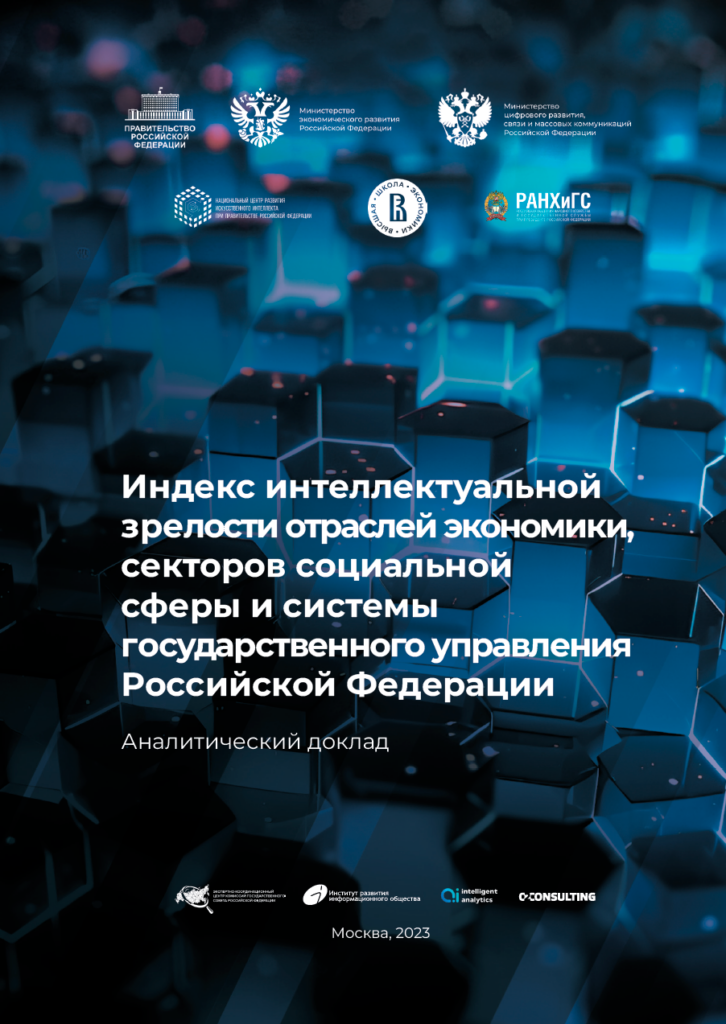On December 11, 2023, a strategic session “Intellectual maturity of the system of regional executive authorities and local self-government bodies of the Russian Federation” was held in Moscow at the ANO “Digital Economy” site. It discussed the results of assessing the maturity of regional executive authorities in terms of the use of AI technologies in the performance of their functions. The session was attended by representatives of federal and regional authorities, expert organizations, including the Institute of the Information Society (IIS) represented by the Chairman of the Board of Directors, Yuri Hohlov.
In accordance with the message of the President of the Russian Federation following the results of the conference “Journey to the World of Artificial Intelligence 2022”, the National Center for AI Development under the Government of the Russian Federation (NCAID) conducted a study “Intellectual Maturity Index” in 2023, which is an assessment of the level of development and use of AI in economic sectors, social sectors and the public administration system at the federal and regional levels, as well as a pilot in 20 local governments. The methodology for assessing the level of intellectual maturity of the NCAID was based on the DECA methodology for assessing the level of a country digital economy development, elaborated in 2017–2018 by IIS jointly with the World Bank Group and first used in the development of the “Digital Economy of the Russian Federation” program. The assessment took place according to groups of indicators related to the production and use of AI, the effects of its use, as well as the factors influencing it (public policy, regulation, personnel, research and development, infrastructure, data, digital trust and security).

To analyze the situation with the development and use of AI in regional executive authorities and local governments, a survey of regional executive authorities from 89 constituent entities of the Russian Federation, including new regions, was conducted. Sergei Nakvasin, director of NCAID, noted: “The study on the intellectual maturity index includes a huge array of initial data, more than 160,000 units obtained as a result of the survey. The survey included over 40 questions, 89 subjects, 18 industries, 55 federal executive authorities and more than 300 local self-governments took part in it. At the end of 2023, the implementation of AI in industries increased by 1.5 times, and next year this figure will also grow. Almost half of organizations develop solutions on their own; organizations note high efficiency from implementation, but there remains a high need for computing power and data to use AI. The next key problem and task is solving the personnel issue; there is a shortage of AI specialists in 62% of regions. To form an objective picture, we have developed an experimental heat map of the use of AI in the regions. in 27 regions we note a leadership level of AI implementation.”
Carrying out such a large-scale study in a short time became possible thanks to the support of federal and regional executive authorities and the cooperation of NCAID with partner organizations, primarily the National Research University Higher School of Economics, RANEPA, the Competence Center of the Federal Project “Artificial Intelligence” (SBER), the Alliance in the field of artificial intelligence, ANO “Digital Economy”, ANO “Expert Coordination Center of the Commissions of the State Council of the Russian Federation”, IIS, Intelligent Analytics, O2Consulting and others.
According to the results of the study, on average in the constituent entities of the Russian Federation, only 13% of regional executive authorities use AI, and 32% have already planned the implementation of AI solutions. In 44% of cases, departments characterize the effect from the use of AI as moderate and significant, and the maximum effects from the use of AI are associated with the quality of implementation of administrative processes and the objectivity of the results obtained. Intelligent decision support technologies are most in demand among regional and municipal authorities, while the distribution of companies developing AI products throughout the country is uneven – in many regions no more than 10 companies are registered. 71% of regions report having data centers to perform basic machine learning tasks, although not everywhere these capacities are sufficient to perform all tasks. Access to data for AI use is lacking in 88% of regions. Strategies for the development and use of AI are not developed in 91% of regions, but more than 70% of regions have documents at the subject level containing separate sections dedicated to the development of AI.
The leader in the use of AI is Moscow. The top regions with the highest level of AI maturity include the Moscow Region, Khanty-Mansi Autonomous Okrug – Yugra, the Republic of Tatarstan, the Voronezh Region, the Republic of Sakha (Yakutia), the Rostov Region, the Republic of Bashkortostan, the Chelyabinsk Region, the Altai Territory, the Sakhalin Region, the Tyumen Region, Republic of Mari El.
The picture of the development and application of AI technologies in Russian regions reflects heterogeneity and differences in the level of technological training and availability of resources. This creates a digital divide between developed and less developed regions in understanding, using and implementing innovative AI solutions.
The study identified typical problems that regions face when implementing AI: lack of necessary digital infrastructure, lack of specialists with the necessary competencies, lack or absence of available technological solutions on the market and problems with data (low quality and/or insufficiency).
When preparing the material, we used the source:
https://d-economy.ru/news/cifrovaja-jevoljucija-kak-iskusstvennyj-intellekt-preobrazhaet-regiony/
